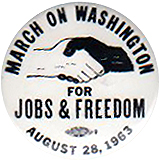Martin Luther King gave his famous “I Have a Dream” speech before 250,000 people attending the March on Washington in August 1963. Latino labor leader Henry Lacayo was there as part of a delegation from the United Auto Workers. Here is a wonderful column written by the Ventura Star‘s Timm Herdt (August 6, 2013) on Lacayo, UAW president Walter Reuther, and the historic march.
* * *
Fifty years ago this month, an up-and-coming labor leader in Southern California received a call instructing him to come to Washington, D.C. Something big was in the works.
 Hank Lacayo was 32 and the head of his United Auto Workers local at an aerospace plant in Inglewood. The phone call was placed at the direction of Walter Reuther, the legendary national president of the UAW. The big thing on the horizon was a planned March on Washington for Jobs and Freedom, scheduled for Aug. 28, 1963.
Hank Lacayo was 32 and the head of his United Auto Workers local at an aerospace plant in Inglewood. The phone call was placed at the direction of Walter Reuther, the legendary national president of the UAW. The big thing on the horizon was a planned March on Washington for Jobs and Freedom, scheduled for Aug. 28, 1963.
“Come on down,” he recalls being told. “We need you.”
It was just a few days before the march, and across the nation apprehension was building. Just three months earlier a civil-rights protest in Birmingham had turned violent, and the televised images of police turning dogs loose on protesters were still fresh.
On “Meet the Press” three days before the march, civil rights leaders Martin Luther King Jr. and Roy Wilkins were asked about the possibility of riots.
As buses and trains across the East and Midwest were being filled to capacity by activists making their way to Washington, Lacayo, joined by Paul Schrade, the UAW’s western regional director, boarded a plane in Los Angeles.
Also on the flight from L.A., Lacayo recalls, was the actor James Garner, who would join other Hollywood celebrities including Marlon Brando and Charlton Heston at the march.
Although the march had been first proposed by the founder of the Brotherhood of Sleeping Car Porters, organized labor did not universally embrace it.
It was Reuther, Lacayo said, who stepped up.
“George Meany of the AFL-CIO did not participate,” he said. “If it hadn’t been for Walter Reuther, this event might not have taken place. The UAW paid for about two-thirds of the costs.”
Reuther and the union were taking a risk. Rank-and-file UAW members were hardly united behind the cause of racial equality. “Some of my members were not happy,” Lacayo said. “We had a contingent from Orange County, which was a hotbed of the John Birch Society.”
Lacayo and Schrade went straight from the airport to Reuther’s hotel. They were told to go to the back of the Lincoln Memorial, where someone would escort them to the front steps. He remembers Reuther’s instructions: “This is something important to us, so stay together.”
About a quarter-million people attended the march. It was integrated crowd; contemporary estimates were that about a quarter of the crowd was white.
Lacayo remembers looking upon the masses from the steps of the memorial. “We were apprehensive, but I thought there was something different about it. We looked out at the reflecting pond and saw all those faces, and people with their feet in the water. People were dressed in suits. This was not a ragtag party of malcontents.”
Ten speakers were on the program that day: six black civil rights leaders, three white religious leaders and Reuther.
The UAW leader’s speech is not the most remembered from that day, but his message was also one of racial justice. “We cannot defend freedom in Berlin,” he said, “so long as we deny freedom in Birmingham.”
It was King, of course, who spoke last. He delivered the speech that defined his legacy and became the signature moment of the civil rights movement.
“I have a dream,” he repeated eight times in a speech of such power and eloquence that it will forever be remembered.
Lacayo, who had been standing on the steps less than 100 feet away, did not immediately grasp the historic nature of the moment, but he was moved. “I got goose pimples,” he says. “I personally was elevated.”
A march that had begun with a sense of apprehension played out peacefully and ended almost rapturously.
“Walter called the White House after that,” Lacayo recalls. It was immediately arranged for Reuther, King and the other civil rights leaders to meet with President Kennedy.
Lacayo, now 82, remains an active force in civic and social causes in Ventura County and across California.
As the 50th anniversary of one of the most memorable days of his life approaches, he knows that Americans will appropriately reflect upon the historic significance of the March on Washington, the “I Have a Dream” speech, and King’s legacy.
At the same time, he hopes that some might reflect also on the legacy of a great man who was his mentor and friend. While it was Martin Luther King Jr. who had a dream, it was Walter Reuther who helped to provide a grand stage from which he could proclaim it.

